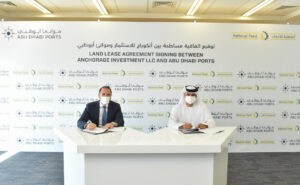Khalifa Port strengthens UAE food security with new facility

During the signing ceremony
ABU DHABI, UAE, 25 January 2021: Abu Dhabi Ports said it has inked a 50-year land lease agreement with Anchorage Investment, for the development of grain storage and processing plants at Khalifa Port, to be managed by National Feed, one of the largest Agro commodity processors in Abu Dhabi.
Making the announcement through a Press release, it said the new facility is set to be developed on a 100,000-square-metre plot. With an initial design capacity of 300,000 metric tons, the facility will introduce grain storage and processing capabilities to the multi-purpose port for the production of key food and animal feed ingredients, it added.
Providing Abu Dhabi Ports’ customers with direct access to competitive food ingredients, the facility will utilise grain resources to convert wheat into flour for baked goods, corn into starch, and glucose, barley, corn, and wheat by-products into animal feed, it said.
Saif Al Mazrouei, Head of Ports Cluster, Abu Dhabi Ports, said: “It is a great honour and privilege that Khalifa Port has been selected to serve as the future home for National Feed’s grain storage and processing facilities. Furthering the capabilities of our multi-purpose port and bolstering our ongoing activities within the region’s food supply chain, the operation will introduce several key advantages for the benefit of new and existing manufacturing customers. Our clients will be able to source ready-made, competitive products quickly.”
Following the official handover of the plot of land in the first quarter of 2021, the new project will house several grain silos capable of storing grain for an extended period, providing Abu Dhabi and the wider UAE with a long-term storage solution contributing to national food security, it said in the release.
Abu Dhabi Ports, part of ADQ, one of the region’s largest holding companies, has witnessed a tremendous increase in demand for food storage solutions across its ports and industrial zones, and has been quick to respond to demand, it said.
As such, it said, it has also developed ultra-modern cold and dry storage installations that provide importers and companies involved in food distribution with robust, efficient and sustainable services, along with local and regional distribution centres for handling food and medical supplies.
Edward Hamod, General Manager, National Feed, said: “We are extremely proud to be part of one of the most important ports in the region and the world. Having direct access to superior logistical capabilities not only enhances our service delivery but also allows us to expand our contribution to the national food security ecosystem.
“A robust logistical offering can play a fundamental role in the accessibility and cost structure of food commodity supply chains. With its deep-water capabilities, a strategic geographical location, and access to an extensive road and future rail network, Khalifa Port will unlock new opportunities for National Feed.” Hamod added that the port will not only increase National Feed’s grain storage and industrial capacities but also enhance the movement of products, which will be instrumental to “the abundance and competitiveness of food and feed strategic commodities in the UAE”.
Following the completion of the new facility, Abu Dhabi Ports said, it will leverage the capabilities of the new food storage and processing plant to extend its food supply chain activities within the region. In addition to expanding Khalifa Port’s role beyond handling food containers and livestock, the new facility, it said, will support the operations of world-leading food production brands that have established themselves in Khalifa Industrial Zone Abu Dhabi (KIZAD).
PHI-Cell technology can benefit the food supply chain, says RGF
Florida, USA, 14 April 2019: RGF’s patented Photohydroionization (PHI-Cell) technology has benefited the food supply chain, said Bill Svec, VP, Water and Food Products, RGF Environmental Group, while highlighting the company’s contribution to maintaining good IAQ in the food supply chain. According to RGF, PHI is an advanced oxidation technology, used to minimise and neutralise air pollutants, such as bacteria, viruses, mould, gases (VOCs) and other odours from indoor air. Pointing to the present scenario, he said, today there are daily reports where food is recalled due to bacterial contamination that occurs in the processing plant or in the supply chain.

Bill Svec, VP, Water and Food Products, RGF Environmental Group
Elaborating, he said, in the past, chemicals were often used as a food safety intervention mechanism, which was not only costly but would also affect the taste and the colour of the food. Today, he added, those who grow food organically benefit most from the technology, and in the food safety aspect, processors have realised that the shelf life of the food product has greatly improved over time.


